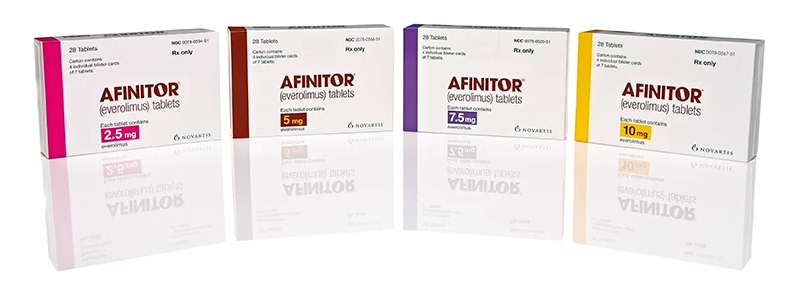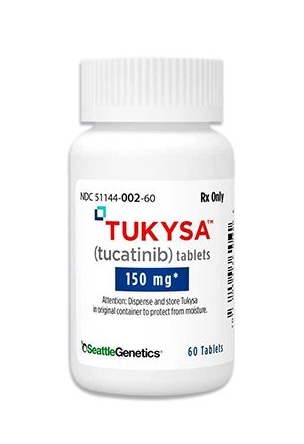Afinitor (everolimus) vs Tukysa (tucatinib)
Afinitor (everolimus) vs Tukysa (tucatinib)
Afinitor (everolimus) is a targeted therapy known as an mTOR inhibitor, commonly used in various types of cancer such as advanced renal cell carcinoma, certain breast cancers, and neuroendocrine tumors. Tukysa (tucatinib), on the other hand, is a tyrosine kinase inhibitor specifically indicated for the treatment of HER2-positive breast cancer, often in combination with other drugs like trastuzumab and capecitabine. The choice between Afinitor and Tukysa would largely depend on the specific type and molecular characteristics of the cancer; for instance, Tukysa would be the preferred option for HER2-positive breast cancer, while Afinitor might be considered for other cancer types where mTOR is a relevant target.
Difference between Afinitor and Tukysa
| Metric | Afinitor (everolimus) | Tukysa (tucatinib) |
|---|---|---|
| Generic name | Everolimus | Tucatinib |
| Indications | Advanced hormone receptor-positive, HER2-negative breast cancer, advanced neuroendocrine tumors, renal cell carcinoma, tuberous sclerosis complex-associated seizures, subependymal giant cell astrocytoma, and renal angiomyolipoma | HER2-positive breast cancer, including those with brain metastases |
| Mechanism of action | mTOR inhibitor | HER2 tyrosine kinase inhibitor |
| Brand names | Afinitor, Afinitor Disperz, Zortress | Tukysa |
| Administrative route | Oral | Oral |
| Side effects | Mouth ulcers, infections, rash, fatigue, diarrhea, edema, stomatitis, cough, headache, decreased appetite, dysgeusia, hyperglycemia, hypophosphatemia, pneumonitis, etc. | Diarrhea, palmar-plantar erythrodysesthesia syndrome, nausea, fatigue, hepatotoxicity, vomiting, stomatitis, decreased appetite, abdominal pain, headache, anemia, rash, etc. |
| Contraindications | Hypersensitivity to everolimus or other rapamycin derivatives | Hypersensitivity to tucatinib |
| Drug class | mTOR inhibitor | Tyrosine kinase inhibitor |
| Manufacturer | Novartis | Seagen Inc. |
Efficacy
Efficacy of Afinitor (Everolimus) in Breast Cancer
Afinitor (everolimus) is a medication that has been shown to be effective in the treatment of hormone receptor-positive, HER2-negative breast cancer. It is specifically indicated for use in postmenopausal women with advanced hormone receptor-positive, HER2-negative breast cancer in combination with exemestane after failure of treatment with letrozole or anastrozole. Everolimus works by inhibiting the mammalian target of rapamycin (mTOR), a protein that plays a critical role in the growth and proliferation of cancer cells. Clinical trials have demonstrated that adding everolimus to exemestane therapy significantly improved progression-free survival compared to exemestane alone, indicating its efficacy in slowing the progression of the disease.
Efficacy of Tukysa (Tucatinib) in Breast Cancer
Tukysa (tucatinib) is a tyrosine kinase inhibitor that is used in the treatment of HER2-positive breast cancer. It is approved for use in combination with trastuzumab and capecitabine for the treatment of adult patients with advanced unresectable or metastatic HER2-positive breast cancer, including those with brain metastases, who have received one or more prior anti-HER2-based regimens in the metastatic setting. Clinical trials have shown that tucatinib, when added to trastuzumab and capecitabine, significantly improved progression-free survival and overall survival compared to trastuzumab and capecitabine alone. The inclusion of tucatinib has been particularly beneficial for patients with brain metastases, a group that often has limited treatment options.
Both Afinitor and Tukysa represent targeted therapies that have expanded the treatment landscape for breast cancer. They offer options for patients with specific subtypes of breast cancer, addressing the need for personalized medicine in oncology. While Afinitor targets the mTOR pathway in hormone receptor-positive, HER2-negative breast cancer, Tukysa targets the HER2 protein in HER2-positive cases, demonstrating the importance of molecular profiling in guiding breast cancer treatment.
It is important to note that while these medications have shown efficacy in their respective indications, they are not without side effects, and their use should be carefully considered by healthcare professionals in the context of an individual patient's overall health and treatment history. Patients on Afinitor or Tukysa should be monitored for adverse reactions and efficacy throughout their treatment course. As with all cancer therapies, the goal is to maximize therapeutic benefit while minimizing toxicity.
Regulatory Agency Approvals
Afinitor
-
European Medical Agency (EMA), European Union

-
Food and Drug Administration (FDA), USA

-
Health Canada

-
Pharmaceuticals and Medical Devices Agency (PMDA), Japan

-
Therapeutic Goods Administration (TGA), Australia

Tukysa
-
European Medical Agency (EMA), European Union

-
Food and Drug Administration (FDA), USA

-
Health Canada

-
Therapeutic Goods Administration (TGA), Australia

-
Swissmedic (CH)

Access Afinitor or Tukysa today
If Afinitor or Tukysa are not approved or available in your country (e.g. due to supply issues), you can access them via Everyone.org.
How it works

Make an enquiry
Choose the medicine you want to buy, answer a couple of questions, and upload your prescription to speed things up. We’ll get back to you within 24 hours.


Make an enquiry
Choose the medicine you want to buy, answer a couple of questions, and upload your prescription to speed things up. We’ll get back to you within 24 hours.


Breeze through the paperwork
We'll guide you through the required documents for importing unapproved medicine, ensuring you have all the necessary information.


Get a personalized quote
We’ll prepare a quote for you, including medicine costs and any shipping, administrative, or import fees that may apply.


Receive your medicine
Accept the quote and we’ll handle the rest - sourcing and safely delivering your medicine.

Some text on this page has been automatically generated. Speak to your physician before you start a new treatment or medication.
Let's talk
If you have any questions, call us or send us a message through WhatsApp or email:
Contact us




